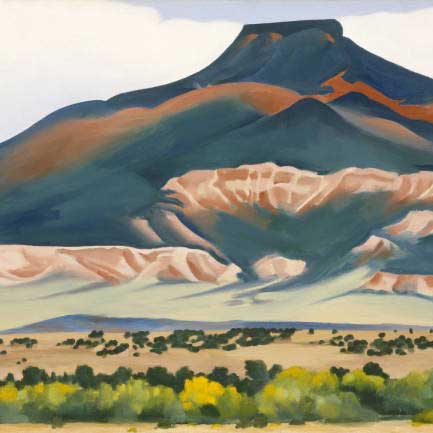CC alumnus Kirt Kempter ’81 returned to campus Sept. 2 to present “The Geologic Story of Georgia O’Keeffe Country.” The lecture was part of The Hulbert Center for Southwest Studies Aficionados Speaker Series and in association with “Eloquent Objects: Georgia O’Keeffe and Still Life Art in New Mexico,” a traveling exhibition on display at the Colorado Springs Fine Arts Center through Sept. 20.
Kempter started his studies at Colorado College as a biology major. An introductory geology course in his junior year changed the direction of his academic journey and career. A Fulbright Fellow, he also earned a Ph.D. from the University of Texas at Austin. Based in Santa Fe, New Mexico, Kempter is a volcanologist, field geologist, and educational tour leader for Smithsonian Journeys. Additionally, he’s worked with NASA’s astronaut training program.
“I’m always grateful to Colorado College and proud to be an alumnus,” Kempter said.
After years of spending summers in New Mexico, once she decided to move there permanently in 1930, O’Keeffe wrote in a letter, “It is what I want to do for my work … the country seems to call one in a way that one has to answer it.”
Kempter described “O’Keeffe Country” as home to myriad rock types from different geologic periods starting 300 million years ago — before dinosaurs roamed the region. He wasn’t aware of O’Keeffe relating to the place in geologic terms, but noted that the focus of much of her work was erosion.
“Erosion creates the beauty in the landscape,” he said.
Cerro Pedernal, a mountain in the region, was one of O’Keeffe’s favorite subjects. “God told me if I painted it enough, I could have it,” she was famously quoted.
Using slides to illustrate, Kempter explained how each geologic period resulted in distinctive layers. He concluded with an image of O’Keeffe’s mountain.
“On the edge of the Colorado Plateau, Cerro Pedernal has every single layer we talked about. It’s a beautiful layer cake of the whole rock story.”
Allison Jones, a volunteer at the Colorado Springs Fine Arts Center, frequently attends events at CC with her husband, Jack.
“This is the best overview of geology I’ve ever heard,” Jones said. “It was amazing, and I loved it.”
The Hulbert Center for Southwest Studies was established by CC Professor Joseph Gordon in 1981. The aficionados luncheon held each block features a lecture about the people, land, environment, arts, and anthropology that enrich the American Southwest. Most of the center’s academic and community outreach programs have been funded by endowments and grants including:
- The Jackson Fellows Scholars Program, funded by the Helen Jackson and William S. Jackson Family Endowment, supports CC faculty in developing interdisciplinary courses with Southwestern content and publishing research on the region.
- A W. M. Keck Foundation grant funded CC’s first Geographic Information Systems (GIS) computer lab.
- The Jerome P. McHugh Family Trust Endowment supports improvements to the Baca campus.
- The Edith Manville Dabb Endowment has supported the retention of dozens of Native American students over the last three decades.
- The Joel T. Benezet Memorial Fund supports the research of Southwest Studies majors and minors.
- Hulbert Center Endowed Funds support the Regional Research Initiative, which has provided students with faculty advisors to community groups engaged in community based participatory research in environmental justice, economic justice, and cultural rights.
- The Andrew Norman Lecture and the Woman’s Educational Society Lecture supports presentations by nationally and regionally known scholars, artists, and professionals.
Learn more about Giving to CC.
